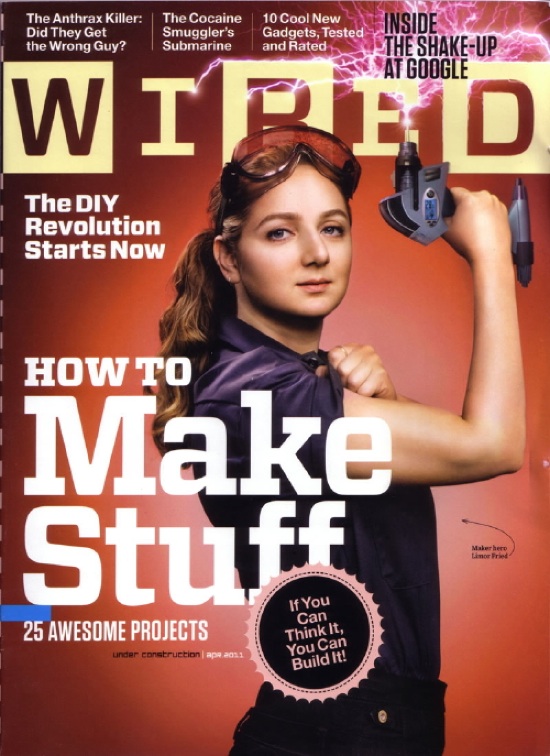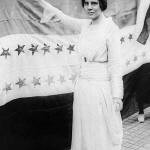Know Your History
Maker Hero

Congratulations to our friend Limor Fried of Adafruit Industries for being featured as a “Maker Hero” on the cover of the April 2011 issue of Wired Magazine. According to Evil Mad Scientist Laboratories this is the first time a female engineer has been featured on the cover.
Read MoreThere is No Future in History
No this is not an April Fool’s Joke, give that 9 Ways has just
spent a month talking about the importance of knowing our history. Rather, it is an intriguing contrary point of view about the less than salutary effects of history from Linda Brodsky M.D. Read it and let me know what you think.
During a Brit family sitcom on NPR last week, a great line popped out of the addled grandfather’s mouth when his grandson told him he was studying history at university: “There is no future in history.”
Read MoreBella Abzug and Florence Feldt: Contrasts in Women's History
Since we’re wrapping up Women’s History Month, this tribute to my mother, Florence Feldt, and feminist icon Bella Abzug–two very different women from the same generation who died on this day in 1998–seems a fitting close.
I hope that you’ve been inspired by this month’s posts, and that they help you create the future of your choice!
My mother Florence Feldt died March 31, 1998.
[caption id="attachment_4037" align="alignright" width="300" caption="Me, my cutie pie sister Candy, and our mother, Florence"]
Read More[/caption]
Ma McDonough Was No Ordinary Woman
Another great guest post. All of them have made this my best WHM series ever. Today’s post is from Liz O’Donnell from Hello Ladies. I hope you enjoy reading about her great-grandmother as much as I do.
 I live in the house where I was raised. Some may think of me as a “townie,” one of those New England creatures who never leaves home. And when they look at my house, I’m sure they see a place that needs lots of work. The yard needs landscaping, the upstairs bathroom needs plumbing, and the kitchen has a gaping hole in the ceiling over the sink (see upstairs bathroom). But what they can’t see is the foundation. Not the cement that supports the frame of the house, but the history that holds me up.
I live in the house where I was raised. Some may think of me as a “townie,” one of those New England creatures who never leaves home. And when they look at my house, I’m sure they see a place that needs lots of work. The yard needs landscaping, the upstairs bathroom needs plumbing, and the kitchen has a gaping hole in the ceiling over the sink (see upstairs bathroom). But what they can’t see is the foundation. Not the cement that supports the frame of the house, but the history that holds me up.
This Women’s History Month. While I honor the women who have, should or will make the history books – Rosa Parks, Lilly Ledbetter, Hillary Clinton and so many others, I find myself thinking about my personal history and one of the women who shaped my life. The National Women’s History Project writes, “Learning about women’s tenacity, courage, and creativity throughout the centuries is a tremendous source of strength.” I know this is true.
Eighty years ago, my great-grandmother Ma McDonough bought the house where I live. At that time, women didn’t purchase property, but Ma McDonough was no ordinary woman.
My great-grandmother came from a well-to-do family in Ireland. As was the tradition then, her older brother was set to inherit the family farm and she would inherit nothing. So Ma McDonough left for Boston, rather than be dependent on someone else. She married, raised four children and somehow managed to save money. When her husband died, she moved out of the city and bought herself and three of her then adult children a new house in the suburbs. It was the Great Depression and the builder had run out of money. Ma McDonough had cash and moved in.
Read MoreIndira Gandhi: World Leader or Witch?
The late Bella Abzug used to say that we would know women have made it when a mediocre woman was as likely to be promoted as a mediocre man. Similarly, we know women have made great strides as leaders when we have to acknowledge imperfections at the same time that we celebrate elevations to power. Thanks to The Daily Femme writer Sara Messelaar, whose thoughtful piece asks important questions about how women leaders–or any historical figures–should be judged. Be sure to read to the end of it and then share your thoughts!
 Just around the corner from my home here in Berlin, the tram stops at the intersection of Berliner Alley and Indira-Gandhi Street. For a long time, whenever the voice in the tram announced “Indira Gandhi Straße,” I thought: “she must have been a really great politician.” That feeling of her “greatness” quietly settled into my subconscious–the very reaction public memorials are supposed to foster in the first place. Mission Public Remembrance Accomplished. Woman’s History Month finally got me to take a real look at Gandhi’s story. I’m really glad I did, because Gandhi’s story is a complicated, unsettling, shocking chapter in women’s history.
Just around the corner from my home here in Berlin, the tram stops at the intersection of Berliner Alley and Indira-Gandhi Street. For a long time, whenever the voice in the tram announced “Indira Gandhi Straße,” I thought: “she must have been a really great politician.” That feeling of her “greatness” quietly settled into my subconscious–the very reaction public memorials are supposed to foster in the first place. Mission Public Remembrance Accomplished. Woman’s History Month finally got me to take a real look at Gandhi’s story. I’m really glad I did, because Gandhi’s story is a complicated, unsettling, shocking chapter in women’s history.
Gandhi (who is not related in any way shape or form to Mahatma, by the way) served as the Prime Minister of India for four terms—longer than any other female Prime Minister in the world. Her position as the leader of the world’s largest democracy was especially impressive, since even today women in India struggle for equal treatment. As Cristen wrote, women are so disregarded in India that they don’t even have adequate public bathrooms for them. Gandhi, however, never let any of that get in her way.
Read MoreWould you expect a circus elephant to work this hard?
England’s reigning Queen Elizabeth holds a place in my history. My family bought our first television set and allowed me to stay home from school to watch her coronation. We cheered the new queen from Temple TX. For years after that, I had a recurring dream that Queen Elizabeth was coming to dinner and I had nothing prepared. I would awaken in a cold sweat after trying unsuccessfully to cobble together a dinner from leftovers I found refrigerated in my grandmother’s multicolored Pyrex dishes.
After reading this lovely piece by Suzan St. Maur, I think I would not stress so much over an unexpected visit from the queen, but rather would order in Chinese and look forward to a chance to chat with a hardworking woman who prepares her own breakfast cereal. Of course, I’d want to ask her about the upcoming royal wedding and what advice she’d give to the soon-to-be princess Kate. What would you ask the queen if she came to have dinner with you?
She’s been doing it since 1952. And she has to travel thousands of miles every year to gigs in far-flung places where she’s expected to be charming, and perform.
 An inhumanely overworked elderly circus elephant, perhaps? Nope. She’s the Queen of England.
An inhumanely overworked elderly circus elephant, perhaps? Nope. She’s the Queen of England.
Or to be more correct, she is Her Majesty Queen Elizabeth II, (titular only) Head of State of the United Kingdom of Great Britain and Northern Ireland plus 15 other Commonwealth realms. Those realms include Canada and various Caribbean nations plus Australia, New Zealand and some further nations in the south-west Pacific.
Of course the British Republicans sneer and snort, waving anti-monarchy banners and saying how dare a woman like Queen Elizabeth complain about her workload when she lives in several different palaces and doesn’t have to worry about paying bills or maxing out her credit card.
Well, I don’t care what the Republicans say: this woman, Elizabeth Alexandra Mary Windsor, to my mind is a huge inspiration to all of us who value the work ethic.
Read MoreWomen's History Open Thread: Infamous Women
In No Excuses, not all of the women I talk about have had a positive impact on women’s lives. In fact, I share a quote from Madeleine Albright that says “There’s a special place in hell for women who don’t help other women.” But should women support women like Michelle Bachmann and Sarah Palin, who oppose policies that help women, such as reproductive rights, fair pay legislation, and social programs that are most likely to help women and children who constitute the majority of those living in poverty?
Read MoreWomen's History Roundup: Create a Movement
Throughout history, men with leadership proclivities have tended to start businesses to create wealth or/and to go into politics. They take the direct path to power for its own sake. Women, on the other hand, tend to start social movements. Susan B. Anthony and women’s rights, Jane Addams and the Settlement House movement, Margaret Sanger and birth control, Candy Lightner and Mothers Against Drunk Driving, and today’s Emily May and Hollaback just to name a few.
The 9 Ways Women’s History Month posts this week are all examples of women starting social movements large and small:
Burning Women: Triangle Fire 100th Anniversary Illuminates Wisconsin Union-Busting
Alice Paul’s Equal Right Amendment Back at the Plow
Violence Against Women: Not in My Backyard – Er, Subway Car
Inspiration from Sin City
What are some other examples of woman-initiated social movements that inspire you?
What new social movement would you start if you could?
Burning Women: Triangle Fire 100th Anniversary Illuminates Wisconsin Union-Busting
Watch the full episode. See more American Experience.
The Triangle Waist Company, site of the fire that fanned the U.S. union movement into full flame, was housed, ironically, in the Asch Building.
On Saturday, March 25, 1911, it became an inferno, snuffing out the lives of 146 employees, mostly women, primarily immigrants, about two-thirds Jewish and one-third Italians, over one-half of them teenagers. Many were girls as young as twelve or thirteen years old. Child labor was routine at the time, as was weekend work.
Triangle’s owners, Isaac Harris and Max Blanck, placed immense pressure on he women to force their treadle sewing machines, like racehorses in their final lap, to produce women’s shirtwaist garments ever-faster. Their goal, not surprisingly, was to raise the factory’s profitability in an increasingly competitive field.
The Asch Building stood in the heart of New York’s Greenwich Village. Triangle Waist Company, a million dollar a year business, was one of the best-equipped factories of its day. Still, it was a horrible sweatshop with few safety provisions and almost no protections for workers against unfairly low pay, discrimination, sexual harassment, and certainly no paid sick leave, health insurance, or vacation.
Precautions against fire consisted of twelve red buckets of water.
Read MoreAlice Paul's Equal Rights Amendment Back at the Plow
“I never doubted that equal rights was the right direction. Most reforms, most problems are complicated. But to me there is nothing complicated about ordinary equality.” – Alice Paul, suffragist and author of the still-not-ratified Equal Rights Amendment
Yesterday, March 22, was World Water Day. That got a modicum of press. But did you  know it was also the 39th anniversary of the date on which Equal Rights Amendment (ERA) passed out of the U. S. Congress and was sent to the states to be ratified? Probably not. And yet, if there is a resource women need as much as clean water, it must be the guarantee of equality under the law.
know it was also the 39th anniversary of the date on which Equal Rights Amendment (ERA) passed out of the U. S. Congress and was sent to the states to be ratified? Probably not. And yet, if there is a resource women need as much as clean water, it must be the guarantee of equality under the law.
The original ERA, introduced in Congress in 1923, was written by Alice Paul, a women’s rights activist instrumental in the 1920 ratification of the 19th amendment, which guaranteed women’s right to vote. Paul also started the National Women’s Party, believing that without a political organization’s clout, women’s concerns would never be taken seriously by politicians. Paul was also one of the few women’s suffrage leaders who realized that getting the right to vote was necessary but not sufficient to enable women to be equal partners in society. She argued that those who had fought for suffrage should then shift their work to getting laws passed that would continue to expand women’s rights.
“When you put your hand to the plow,” Paul said, “you can’t put it down until you get to the end of the row.”
How right she was! And we aren’t there yet.
Read More